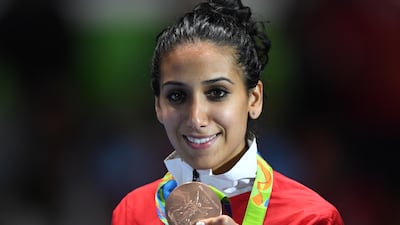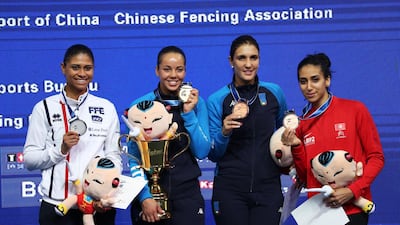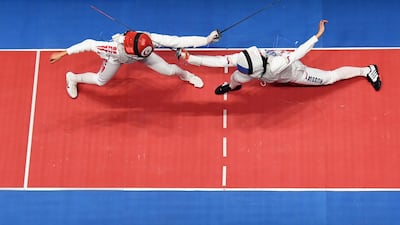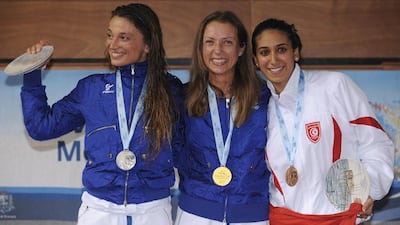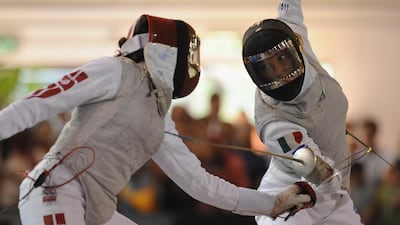As part of our buildup to the Tokyo Olympics we will be profiling Arab athletes and para-athletes as well as those from the Mena region hoping to make it to this summer's Games
People who see Tunisian fencer Ines Boubakri in her day-to-day life often cannot believe it when they witness her ferocity while competing on the strip.
Away from sport, the Olympic medallist is shy, soft-spoken and non-confrontational. In competition mode, she is intimidating, aggressive and unafraid of showing her emotions. She screams, she fist-pumps and stares down her opponents. If she feels hard-done by a referee in a call, she will not hesitate to argue her case.
As one of six Arab women to secure medals in Rio, highlights from Boubakri’s bronze medal bout at the 2016 Olympics were frequently played on BeIN Sports, her fiery celebration becoming an iconic moment cherished by the Arab world.
"When I enter a competition, I'm more aggressive. I've been like this since I was a kid. My mom was the same, she was aggressive and loved winning, she was very passionate with fencing and I feel like that came to me naturally," Boubakri told The National.
“That helped me a lot through many difficulties I faced in the sport of fencing. As an Arab, as an African, as a woman, coming from a country with no fencing culture, you have to prove yourself.
“I was able to reveal myself to the world; even with the referee I am aggressive. Like, ‘No it’s my touch’.
“So with time, people started to know me and to respect me. It complemented my personality in fencing and it helped me prove myself: I’m here, I exist.”
Boubakri’s mother, Henda Zaouali, is a retired fencer who competed at the 1996 Atlanta Olympics. She was the gateway for her daughter into the sport and used to coach her in her early days.
When Boubakri clinched bronze in Rio 2016, she became the first ever African woman to win a fencing medal at an Olympic Games. She was also one of just three Tunisians to make the podium that summer in Brazil.
Missed opportunity in Rio
Boubakri had sustained a back injury during the semi-finals and blew a lead against Italian Elisa di Francesca to miss out on a chance to fight for the gold medal. That missed opportunity still plays out in Boubakri’s mind and has fuelled her desire ahead of her fourth – and possibly last – Olympics appearance in Tokyo later this year.
“The biggest motivation I have is to make the podium in Tokyo,” said the 32-year-old.
“What I’m focused on is that while I have already won a medal, I still have this small regret that I didn’t do better. So there is this small part in me, in my heart, that keeps saying, ‘I will do the best of my best because who knows, it may be my last Olympics. I don’t want to have any regrets’.
“I want to leave the competition, at the end of the day, even if I lost in the first bout – of course it would be hard to accept, but I will say thank God I did my best, and I won’t blame myself for not working harder. That’s my motivation, to keep going and make the podium.”
As has been the case for many athletes around the world, preparation for Tokyo has not been easy for Boubakri.
The Olympics were postponed by a year due to the pandemic, and while the news came as an initial shock, Boubakri quickly accepted it because she could see how the entire planet was being affected by the coronavirus, and that the health and safety of everyone should be the top priority.
The France-based fencer managed to go on holiday in Tunisia, and got to spend quality time with friends and family at home for the first time in nearly a decade.
“I was super, super happy. It got me into a positive mind space before returning to France in September to get back to training,” she recalls.
But barely a month into her training, news broke out that France was entering another lockdown and Boubakri started panicking. Unlike the French national team fencers that were given access to training facilities and had each other to practice with, she had no one and nowhere to go.
It also didn’t help when the FIE (International Fencing Federation) kept cancelling events, and the season, which typically starts in October, kept getting pushed back. The fencing calendar has yet to be confirmed, and the Olympics are just six months away.
“Going to the Olympics without enough competition under your belt, without knowing where your level is at, that’s the pressure I am feeling at the moment,” said Boubakri.
She was given a lifeline though when a friend of hers suggested she fly to Dubai and start training in the UAE for a few months.
“I quickly spoke to my coach and I booked a flight overnight to come to Dubai. It was a spontaneous idea and I do not regret it. The weather is amazing, I have a lot of friends; everyone is encouraging me and supporting me.
"I have a programme set by my coach, I train in Abu Dhabi sometimes, other times I’m in Sharjah. So I’ve been training,” she said.
Motivated by finally having decent practice conditions, Boubakri pushed herself a little too hard and aggravated a knee injury.
She is currently getting treatment at the Fifa Medical Centre of Excellence in Deira and assures the issue is not too serious. “I’m confident I’ll be back even stronger,” she added.
Tokyo woes
A lot of uncertainty still remains ahead of Tokyo. Official qualification for the Games hasn’t been finalised with one sole competition yet to be scheduled.
The world’s top fencers were all in Los Angeles last March for that one remaining event that would secure their spots in Tokyo but the competition was cancelled just a few days in advance due to the coronavirus outbreak.
It’s now nearly a year later and that event has yet to be rescheduled. Boubakri is confident she will qualify as the top African fencer in the rankings but she admits dealing with the unknown has been challenging.
“I’d be lying if I said, ‘It’s all good, it’s okay’. I passed through some phases where I was just asking God what I should do. But these tough times also fuel me to keep going and to be super-motivated. We still have time and these are going to be a special Olympics and whoever proves to be the strongest on the day will be the champion,” she said.
Boubakri takes great pride in her journey and continues to inspire younger athletes across the Arab region. She explains that the pressure of expectation from her supporters back home is easy to manage because “the pressure I put on myself will always be greater”.
She wishes Tunisia would give her a bigger platform to share her experience and concedes that, unfortunately, the sponsors did not come knocking on her door after her Rio heroics – a fact that makes her particularly grateful that her main backers, Citroen, have remained in her corner.
“I was ready to make conferences and give talks about my experience. I get these calls and requests from other Arab countries but rarely from Tunisia,” Boubakri stated.
“I was somewhat disappointed because they haven’t thought about using my success to encourage others. But I’ve seen a lot of girls in Arab countries who fell in love with fencing and wanting to train. That makes me happy.
“They reach out on social media, asking me questions, asking for advice. But nothing from my country; that hasn’t changed.”
Legacy talk
Boubakri plans on making a bigger impact after her retirement from the sport. She hasn’t fully decided on when she would like to hang up her foil, but it seems like Tokyo could be her swansong.
“I never thought of stopping my career after Tokyo, but when the Games were postponed, and with all my injuries and everything, I told myself, ‘Okay, I think it’s going to be my last Olympics’, because I want to respect myself, I want to finish at the top and I don’t want to make people believe that I’ll be around, just for lying.
"I want to be honest with myself and the people around me and the people following me,” she explained.
“For now, I’m just focused on the Olympics and I’ll see what happens after that. But I’m not going to lie, it has crossed my mind that I may stop after Tokyo.
“I’m a person who wants to live other things, because I’m not getting a lot of money from fencing. So as an independent woman, I have diplomas and I want to make another career in something else.
“I’m a certified PE teacher and I have a Masters in sports psychology. I could become a PE teacher but I would also launch my own academy somewhere in the Middle East or in Tunisia so I could share my experience with people who want to train.
“As an Arab woman, I’d love to encourage the young girls in this region to strive to reach a high level.”
There may be a great degree of uncertainty during these difficult times, but one thing is clear: Boubakri will not rest before securing a lasting legacy in Arab sport.
